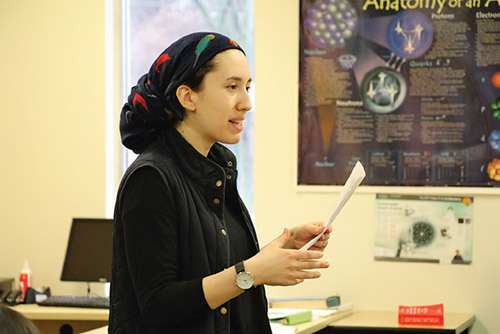



In addition to learning Haggadah and hilchot Pesach, Ma’ayanot students prepared for their Sedarim during the school’s annual Yom Iyun, or morning of learning, whose theme this year mainly revolved around the question, “What will I be freed from this Pesach?”
“We know from the Gemara in Pesachim that each of us is required to see ourselves as if we actually left Egypt, but what does that mean?” asked Ora Schrier, director of Torah programming. “We organized the interactive part of this year’s program around the concept of ‘what does it mean to be free in today’s society’ in terms of freedom from technology, freedom from other people’s expectations or judgment and freedom from materialism and the need to always have more.”
Students chose from a wide variety of classes that touched on these and other themes, followed by an interactive program in which they watched four short video clips and then discussed an “action point”—a way in which each student might change something in her life based on what she learned.
“The topics ranged from the laws and mitzvot of the holiday, to the liturgy, to current events such as recidivism in our prison system and child slavery,” said Schrier.
The shiurim included “The ‘Shawshank Redemption’ and Freedom” by Sarah Gordon; “Of Baseball and Bogeyman: Free Will and a God Who Plays Favorites” by Rabbi Donny Besser; and “Moshe’s Stuttered Path to Leadership” by Yael Weil.
In her class calling “Killing Time: The Free (Wo)man’s Fear,” Schrier spoke about the concept that slaves do not have control over time. Accepting the Torah and choosing to do mitzvot is a way of taking control of time. “If you’re wasting time, you are in a sense ‘killing time,’” Schrier said. She emphasized the importance of using our freedom—and our time—for good.
In “Paul Revere, H.W. Longfellow, and the Pesach Seder,” Rabbi Zev Prince, director of co-curricular programming, focused on the importance of a shared narrative, and personal, religious and national pride. In the same way Longfellow’s celebrated poem “Paul Revere’s Ride” was meant to inspire a people on the verge of war, the annual retelling of the story of our exodus from Egypt is meant to motivate and unite the Jewish people.
Reflecting on the Yom Iyun, sophomore Meira Cohen said, “I learned that nothing is handed to you in life. You have to work hard to get it.”













